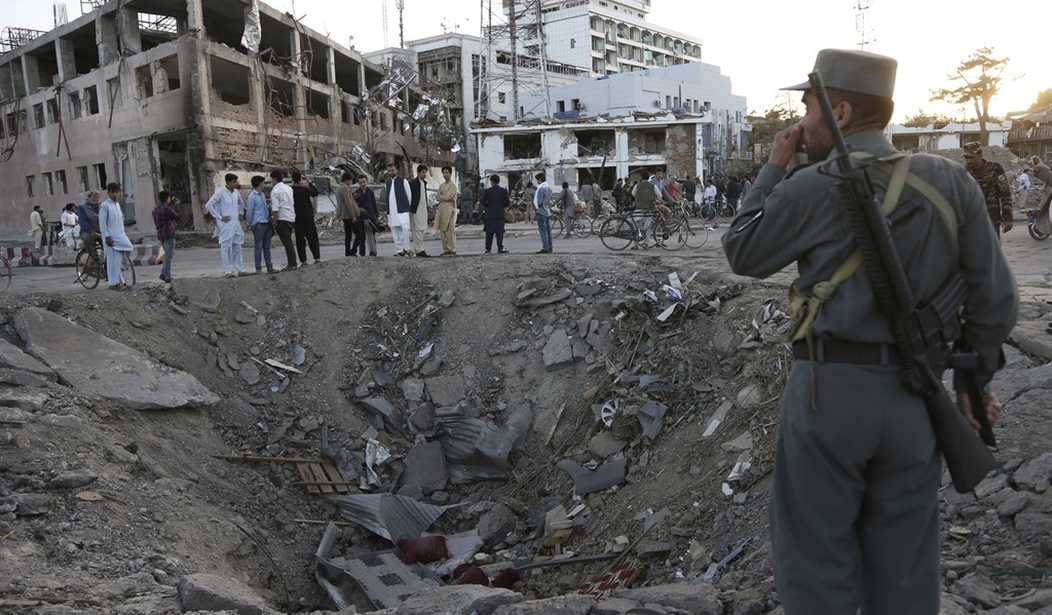Chances are, you heard plenty about the latest terrorist attacks in Britain. But the chances that you heard about the most recent attack in Afghanistan -- in which a suicide truck bomber set off his deadly payload in rush-hour traffic near the German embassy in Kabul -- are much lower. Why?
Perhaps it’s a natural consequence of news overload when it comes to terrorism. When such attacks become common, it takes a lot to cut through the headline clutter and make an impression. Or it could be because the war in Afghanistan has gone on for so long that we’re experiencing simple news fatigue about it.
Such fatigue can lead people to lose sight of why the United States is in that country in the first place, let alone why we should remain. “Why Are We Still in Afghanistan?” reads the headline of a June 5 CBS News commentary, while the one on a June 3 Washington Examiner flatly states: “The U.S. Can’t Fix Afghanistan, and It Should Stop Trying.”
Part of the problem can surely be traced to shifting war aims, as defense expert Luke Coffey ably demonstrates in a June 1 article for The National Interest.
In the immediate aftermath of 9/11, our aim was pretty straightforward: to deny Al Qaeda a safe haven from which to launch terrorist attacks, and to remove the terrorist-harboring Taliban from power. Once that was accomplished, the focus morphed into nation building and “bringing democracy.”
However laudable this may sound, though, a fundamental problem lurks: How do you measure success? And so, 16 years later, the question of why we’re there inevitably arises. Thousands of troops have been killed, Coffey notes, and nearly $1 trillion spent. Should we still be in Afghanistan?
Recommended
In a word, yes. Although we can point to some concrete success -- the violence in Afghanistan is way down, and Al Qaeda was indeed denied its safe haven -- we need to consider what author and military expert James Carafano calls the strategic consequence of failure. He points to three reasons the U.S. needs to be there.
One is that we’re currently waging a crucial fight to crush ISIS in the Middle East, a fight that is succeeding. The last thing we need at this juncture is to pull back from Afghanistan and yield new hunting grounds to embattled terrorist groups. We can’t allow Afghanistan to revert to its pre-9/11 environment once again.
Secondly, we don’t want to contribute to regional instability in Asia. Pulling back when things are particularly bad in two other critical hot spots, the Middle East and western Europe, would be a serious mistake.
Third, a bigger terrorist presence in Afghanistan would ratchet up tensions between Pakistan and India, both of which possess nuclear weapons. That’s hardly a wise idea.
That doesn’t mean we’re there to “nation build.” According to Coffey:
“The goal in Afghanistan is to get the forces to a level where they can handle the insurgency themselves, without tens of thousands of Western troops on the ground. If the West continues to mentor, train, and fund the Afghan military, the Afghans will eventually be able to take on the insurgency themselves.”
There are numerous smart and specific ways we can show our commitment to Afghanistan. One is to state very clearly that our goal is to keep America and our allies safe. This means a “stable enough” Afghanistan that can manage its own internal and external security.
Further, we need to keep NATO committed to Afghanistan, and press international partners to provide their fair share of funding for Afghan security forces. And if President Trump is going to increase the U.S. troop presence, we should encourage NATO countries to step up their troop contributions as well.
We’ve worked hard in Afghanistan to make the world safer. It’s time to build on our successes there -- and give the terrorists no quarter.

























Join the conversation as a VIP Member